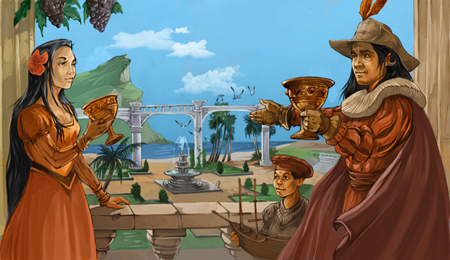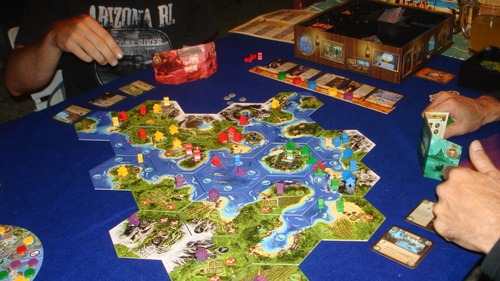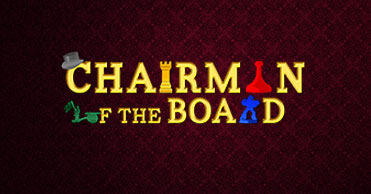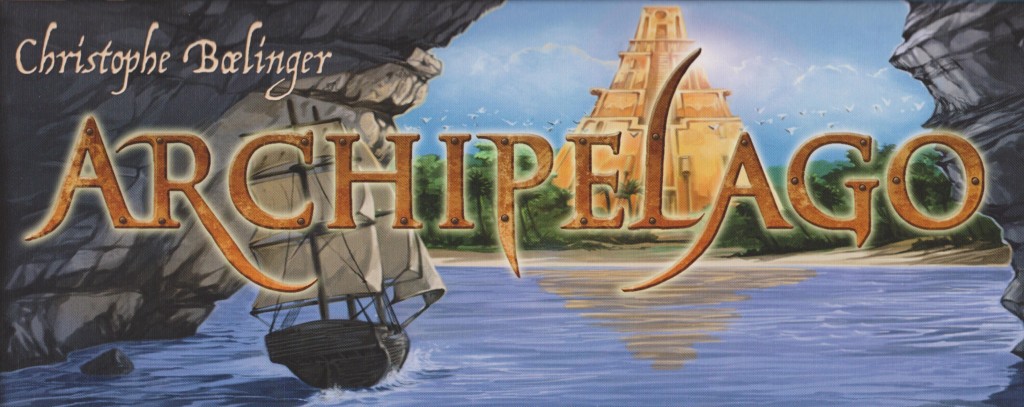At the end of the day, a board game’s theme is only a coat of paint…but let’s not discount how important that coat of paint really is.
You may be drawn to a specific game because it features spaceships and you like spaceships. Maybe you picked up another game because it has zombies on the cover and you enjoy zombie stories. Fan of wars between ancient civilizations? Well, then you’ve certainly entered the right hobby!
The art on the box, the promise of the kind of story you’ll be telling around your table, is the easiest way for a game to get someone’s attention. Ultimately, that theme is simply the window dressing on a collection of mechanics that may or may not be satisfying. in the case of truly great games, the theme complements how the game is played, feeding into every action, coloring every choice, and forcing you to practically role-play your turn. When an impeccably designed set of rules meet the right theme, the result is something miraculous — you start to play the game and make decisions like you actually live in the universe pictured on the box. This is how the best tabletop games in the world are born.
But not all games are spaceships and zombies. Hell, not all games are developing the French countryside or building efficient train routes. Some games are built around themes that are genuinely abhorrent and (this is the important part) don’t seem aware that they’re dealing with something offensive and disturbing. I am, of course, referring to the board gaming medium’s obsession with European colonialism as a theme.
 I’m not here to give you a history lesson since you’re probably a smart person who knows all of the basics already, but here’s the rundown: for hundreds of years, white people from Europe sailed around the world taking land that didn’t belong to them and generally being bastards to all of the brown people they encountered along the way. Thirty seconds of research will tell you all about how Christopher Columbus’ arrival on the “new world” was less of a great moment for civilization and more of a great moment for people who like rape, torture, murder and the decimation of entire tribes of people. Human beings have a habit of being despicable lowlifes, but this is one the most popular tracks on our Greatest Hits album.
I’m not here to give you a history lesson since you’re probably a smart person who knows all of the basics already, but here’s the rundown: for hundreds of years, white people from Europe sailed around the world taking land that didn’t belong to them and generally being bastards to all of the brown people they encountered along the way. Thirty seconds of research will tell you all about how Christopher Columbus’ arrival on the “new world” was less of a great moment for civilization and more of a great moment for people who like rape, torture, murder and the decimation of entire tribes of people. Human beings have a habit of being despicable lowlifes, but this is one the most popular tracks on our Greatest Hits album.
It’ll be difficult to find anyone who disagrees that this was an age worth cherishing, which makes all of the board games centered around the subject feel, for lack of a better word, gross. There’s no denying that Puerto Rico is a great game (one of the greatest of all time, even), but note that the Meeples you have toiling in your sugar are black and try not to feel a little sick to your stomach. Games from the European school of design tend to embrace more historical and quaint themes, but operating a plantation on Puerto Rico during the age of colonialism is historical and quaint in the broadest strokes only. Take even a slightly closer peek and you’ll discover a game where you’re forcing slaves to work in your fields so you can win victory points.
Yeah, I’ll be the first to admit that my hypocrite flag is showing a bit. I’ll gladly play games where I backstab and murder my friends. I’ll gladly play war games based on actual wars. I find Spartacus: A Game of Blood and Treachery (where you buy gladiators at market and pit them against your friends’ human property in battles to the death) to be absolutely delightful.
So why does this particular theme bother me so much? With most games, you can chalk up violence and chaos to telling a great fiction story. With historical war games like Axis and Allies, you’re dealing with a generally righteous conflict that’s still being debated and analyzed by history buffs today. And Spartacus? Well, Spartacus is so silly and soap operatic in its storytelling that you stop connecting it with actual history altogether.
But the wounds are still fresh from the age of exploration. Entire civilizations are still reeling from the events of a couple hundred years ago. This was not a massive war between equal opponents, it was a slaughter. To be more specific, it was a slaughter that many board games completely whitewash, treating conquered people as just another route to victory points or a worker to place on your board.
There’s probably no way to feel good about playing games that deal with this subject and it’s hard to simply stop playing them. There are too many amazing games, too many important and influential designs that use this theme to ignore. To make matters more complicated, this is a theme that’s still being used on great games being published today. I recently sat down with Christian Boelinger’s Archipelago, a game that sees players exploring a randomly generated island chain, stripping it of resources and subjugating the local populace.
As ugly as that theme is, the game is brilliant. Archipelago feels representative of the future of board gaming, where designers will stop working in narrow design niches and start to freely borrow from everything that’s come before. This is a worker placement game where your decisions power 4X exploration, with everything governed by a tense auction mechanic. It feels like five games in one, with all of the seemingly disparate parts working together seamlessly. It’s a triumph of game design, a clockwork of mechanics where every decision you make will have repercussions around the table. I’ve never played anything quite like it and I can’t wait to play it again.
 But there’s no denying it: you feel like an outright bastard when you play Archipelago. Rather than be the hero of your own personal tabletop story, you feel like the villain. In its own way though, the game acknowledges this. The native population isn’t abstract in Archipelago. It’s always present, tracked by its own little chart. If you create too much chaos and too much unhappiness, the figure on the chart rises, sowing revolution. If revolution ignites, the colonists are run out and everyone at the table loses.
But there’s no denying it: you feel like an outright bastard when you play Archipelago. Rather than be the hero of your own personal tabletop story, you feel like the villain. In its own way though, the game acknowledges this. The native population isn’t abstract in Archipelago. It’s always present, tracked by its own little chart. If you create too much chaos and too much unhappiness, the figure on the chart rises, sowing revolution. If revolution ignites, the colonists are run out and everyone at the table loses.
Perhaps the secret genius of Archipelago isn’t the design, but the fact that it acknowledges that actions have consequences. The game operates as a series of barely controlled chain reactions, keeping you constantly aware that everything you do will come around to bet you in the end. Archipelago may not be the most culturally sensitive game out there, but it’s a step forward for a genre that’s been making gamers uncomfortable for decades. You can’t be the bad guy and expect the people you hurt, even if they’re just numbers on a chart, to not turn around and wreck your silly little game.

